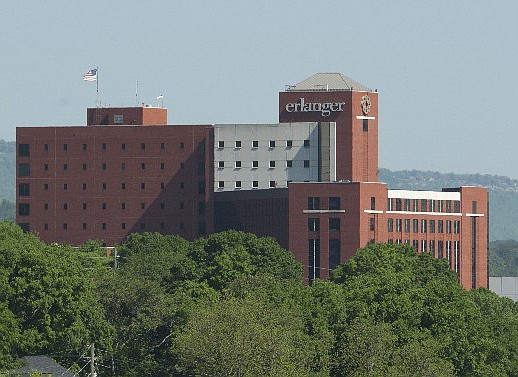WHAT IS A CERTIFICATE OF NEED?A Certificate of Need ("CON") is a permit to establish or expand a health care facility or service. The program regulates the state's health care industry to prevent uncontrolled growth of certain facilities and services that could increase the cost of health care or take away ability of full service providers to provide the uncompensated care they give.Source: Tennessee Health Services and Development AgencyWHAT IS A PET-CT SCANNER?A PET-CT scanner combines images from a PET scan and a CT scan that have been performed at the same time. Together, the two kinds of images allow for a clearer picture of what is happening inside the body.• PET stands for positron emission tomography. It uses a radioactive tracer to show organ and tissue function.• CT (computer tomography) scans are much more detailed. They use X-rays to create pictures of organs, blood vessels, bones and the spinal cord.Source: University of Tennessee Medical Center
Erlanger Health System hopes that a $4.5 million investment in a new high-tech scanner could one day serve future cancer and neuroscience centers at the hospital.
But first, the public hospital will have to go before a state board to justify the need for another PET-CT scanner -- and prove that the potential purchase isn't just part of a medical arms race in a region where hospitals are highly competitive.
The scanner the hospital is trying to buy combines images from a PET scan and a CT scan. A CT scan shows tissues and organs inside the body, while a PET scan reveals any abnormal activity that could be happening in those organs.
Erlanger has already applied for a "certificate of need," which is a permit that allows health care institutions to undertake major projects.
"Erlanger really needs its own PET scanner," said CEO Kevin Spiegel. "There isn't any cancer program at any academic hospital in the country that doesn't have one. We're also the safety-net hospital in the region. People should be questioning what really happens to the indigent community in Chattanooga without a safety-net solution for cancer patients."
Spiegel said the scanner could also one day serve a cancer center and a neuroscience center at Erlanger, two expansions he hopes to see during his tenure.
In its application to the state health planning board, Erlanger says it hopes to use the scanner to better diagnose and treat cancer, Parkinson's, Alzheimer's and other diseases.
There are five other providers with PET scanners in the area: Memorial Hospital, Chattanooga Imaging East, Diagnostic Center and mobile units in Bradley and Rhea counties.
But the hospital says that having its own PET-CT scanner "fills an essential gap" in its neuroscience and oncology services and will create better continuity of care.
There are two key reasons why hospitals need the state-issued certificate of need before they can purchase a PET scanner, said Jim Christofferson, general counsel for the Tennessee Health Services and Development Agency.
Since PET scans are a diagnostic procedure, there is concern that overuse of scans could drive up overall health care costs in the area, Christofferson said.
And because the scans are a profitable service, there's also the worry that having too many could drive higher competition for profit, and detract from a hospital's ability to provide necessary unprofitable services, like emergency care and obstetrical care.
"If you had a PET at a Walgreens at every corner, it would not result in lower costs, but in over-utilization and require more health care providers to operate them," Christofferson said.
Erlanger argues that the region -- especially the indigent and uninsured population it treats -- is underserved when it comes to such scans. The hospital claimed that at least five counties in Erlanger's service area have higher mortality rates for heart disease, stroke, cancer and Alzheimer's than the state average.
Based on the area's disease ratio, nearly 1,000 more scans should be performed in the region each year than are now, Erlanger claims.
As a part of the CON application process, other groups and medical providers are allowed to argue against Erlanger's request.
Memorial -- Erlanger's closest competitor for market share -- is not planning any opposition, said spokeswoman Lisa McCluskey.
"Imaging is considered a standard for care for a cancer program, and I believe that was our reason for deciding not to oppose," she said.
It is unclear if other providers will try to fight Erlanger's application.
Erlanger says that because it pulls from a large geographic area, provides indigent care and has unique services like its Level 1 trauma center and stroke center, a PET scanner at the hospital "will have a negligible impact on the PET utilization at other sites."
The hospital also says an aging population and a spike in insured Tennesseans under the Affordable Care Act will create more demand for PET scans.
The hospital is scheduled to make its appeal before the Health Services and Development Agency Board in October.
Contact staff writer Kate Harrison at kharrison @timesfreepress.com or 423-757-6673.

